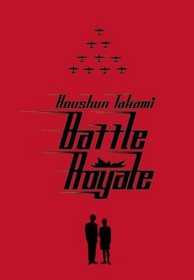Helpful Score: 3
The book that the hyper-violent Japanese cult movie was based on. I was surprised that the story was actually not gratuitously violent. The violence is an integral part of the story: In an alternate-reality Japan, the country has been under fascism since after WWII. The government has reverted to an extremely isolationist policy, and citizens unquestioningly accept abuses, and practices like the Battle Experiments in which random highschool classes are selected, taken to a small island in the Seto Inland Sea, and told that they must kill each other or be killed. The book follows one such class and deftly explores the psychological reactions of the very different people in the class, as they react to this extreme situation.
The reasons behind these experiments do not actually have to do with studying battles, as the public is told, but are for control of the citizens at large. When the population sees that consistently, friends, colleagues and lovers WILL turn against each other and kill each other, this undercuts any possibility of a large-scale revolution against the government. The book is also extremely critical of aspects of (actual) Japanese culture that are against individuality, and that the author seems to believe encourage groupthink. I think one of his main points in the book is that, although the reader might initially see a group of classmates, all the same age, wearing the same uniform, seemingly homogeneous, as the book progresses, we get to know each person, and find out their secrets, seeing how each person is different possibly bad, possibly good, to varying degrees, but always unique.
A very interesting work the one criticism I have of it was the translation. Too often, phrases, metaphors and slang terms seemed to be too literally rendered. The narrative never really flowed at no point could I forget that I was reading a translation from the Japanese.
The reasons behind these experiments do not actually have to do with studying battles, as the public is told, but are for control of the citizens at large. When the population sees that consistently, friends, colleagues and lovers WILL turn against each other and kill each other, this undercuts any possibility of a large-scale revolution against the government. The book is also extremely critical of aspects of (actual) Japanese culture that are against individuality, and that the author seems to believe encourage groupthink. I think one of his main points in the book is that, although the reader might initially see a group of classmates, all the same age, wearing the same uniform, seemingly homogeneous, as the book progresses, we get to know each person, and find out their secrets, seeing how each person is different possibly bad, possibly good, to varying degrees, but always unique.
A very interesting work the one criticism I have of it was the translation. Too often, phrases, metaphors and slang terms seemed to be too literally rendered. The narrative never really flowed at no point could I forget that I was reading a translation from the Japanese.
Helpful Score: 3
Simply amazing. I highly recommend it.
Helpful Score: 3
This is one of my favorite books. it is well written and pretty creative. if you dig kids killing kids you may get a kick from this one
Helpful Score: 2
very compelling, like the car wreck you can't look away from. it was very gorey and extremely violent, but the violence and allegory were there for a reason. i enjoyed it and was disturbed by it at the same time. i'd love to read more japanese fiction because of this book. the concept is really interesting.
Helpful Score: 1
I've been eager to read this book for a while since I own both Battle Royale movies and I read the manga years ago. This book is as troubling as it is insightful- troubling because it shows you the truth depth of human desperation and troubling because it makes the reader enjoy it. This book isn't full of thesaurus words or flowery, flowing descriptions. It's simple and to the point, and every effective. The book shows us how people, normal people, can descend into madness. How many of us would be able to kill someone? I'm sure many people would say, "not I," yet how do we know until we're put in that position? Each character in the book experiences their own personal reaction to fear, violence and the threat of death, which could come at any moment. How each handles this situation is where the insight comes in. We come to see that fear is more complex than the word describes. Some justify killing with logic, however poor, some do it out of instinct, and some do it to protect others. This isn't a book to pass over lightly because of its subject. I know that the thought of middle school students killing each other off on an island is sour, but Battle Royale is an excellent book about human nature and how humans exist in a world out of their control. There is hope, though! The main characters Shuya and Noriko fight a force far larger than themselves, which gives a glimmer of hope in the madness. Granted, there is no peaceful resolution at the end. The world as the characters know it does not crumble or end. It stays strong and in control, but the resistance of a few is only a minor shine to the possible resistance of many. Even in a world of chaos and death, there is loyalty and friendship.




